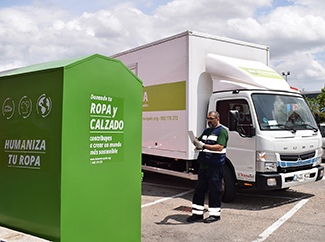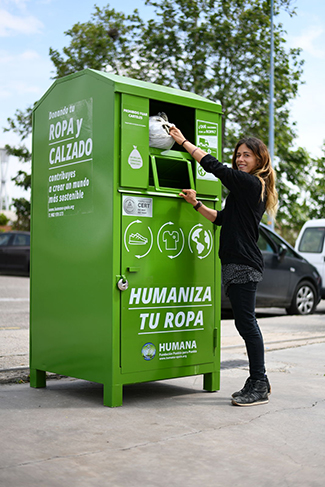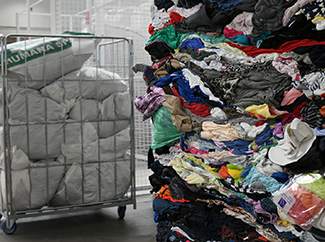consent_cookie
Duración: 1 year
Stores the user's cookie consent state
03-02-2021
Humana has collected 16,270 tons of used textiles in Spain during 2020 to give them a second life through reuse or recycling. This is a lower figure than the previous year (17,573 tons), because 2020 has been an extremely complex year as a result of the pandemic.
It is true that the collection activity has been maintained in general throughout the year, even in the weeks of strict confinement last spring, since the recovery of waste is considered an essential service. However, the slowdown and / or paralysis of economic activity on a national and global scale has meant a real crash in the global market for second-hand clothing.
The sector faced an almost perfect storm, seeing its usual source of resources frozen: the sale of clothes through secondhand stores and their wholesale marketing in international markets. In the specific case of Humana, it represented the closure for more than two months of the preparation plants for reuse and its network of stores, which led to a Record of Temporary Employment Regulation for 85% of the workforce.
Despite all this, the organization has continued with its activity, adapted to the new socioeconomic and health reality. This has meant a decrease in the number of Humana sustainable fashion stores, which stands at 48 today. If the socioeconomic and health context improves, the outlook for this year is encouraging.
A management with a vision of circular economy
“Humana contributes to making the waste management sector more sustainable with a vision of circular economy”, says Elisabeth Molnar, general director of the Foundation, “since it reintroduces garments in the value chain, generates resources with a social impact positive, creates green and sustainable employment, affects the local sphere and promotes the improvement of the living conditions of the most disadvantaged communities thanks to development cooperation programs ”.
Molnar recalls that in 2025 all the countries of the European Union must have established a separate collection for textile waste, "which will undoubtedly increase the low rates of separation at origin, which now do not exceed 10% in Spain." “From Humana we applaud the work of the municipalities that promote the selective collection of textiles. We are facing an opportunity and a huge challenge to give the definitive impulse to the appropriate management of this resource, faithful to the hierarchy of waste and to a circular economic model, in which prevention and reintroduction of textiles in the production chain prevail, prolonging its life cycle ”. The 2025 horizon and the EU goals on textile waste could lead to the establishment of a Collective System for Expanded Producer Responsibility (SCRAP), similar to the one that works for other fractions, such as paper or glass.
The challenges for 2021
In a context as complex as the current one, the Foundation's imminent objective continues to be to contribute to the stability of the textile collection service, adapted to the new normal. And from there, continue advancing in the goals already set in previous years, with the in sight always in 2025. To do this, it is necessary to increase containerization in public space to facilitate donations from citizens.
And it is that in Spain a million tons of clothes are discarded annually (each citizen discards between 30 and 40 kg of textiles a year, according to data from the Waste Agency of Catalonia and the Ministry for Ecological Transition) but only one 10% reaches the hands of an authorized manager; the rest (900,000 tons) ends up in landfills where it cannot be used in any way. "It is essential to increase the number of collection points to increase these records, taking into account that the current ratio of containers per 1,000 inhabitants is far from being appropriate," says Elisabeth Molnar.
Another major objective is for the sector to have a homogeneous information system that allows knowing in a transparent way how much textile waste is recovered, reused, recycled or disposed of in Spain. "Transparency in traceability throughout the value chain and making the destinations of the different waste streams visible is essential", defends Humana's CEO, "the existence of reliable indicators is key to the operation and credibility of the system, as well as to give confidence to citizens ”.
In addition, the Foundation intends to continue delving into the social factor of textile management, emphasizing the importance of promoting this factor in the public procurement documents for this service.


